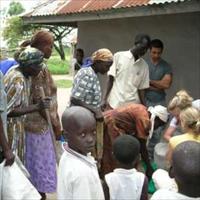DRC: Fighting interrupts food aid to 300,000 in the east

The UN World Food Programme (WFP) has suspended the delivery of food aid to as many as 300,000 vulnerable people because of renewed fighting in eastern Democratic Republic of Congo, officials said.
The fighting in the volatile North Kivu province is between forces loyal to dissident General Laurent Nkunda and the Congolese Armed Forces (FARDC).
WFP said its trucks would no longer travel outside Goma, the capital of North Kivu, after violent clashes erupted on 3 December as the FARDC battled rebels in the garrison town of Nyanzale and the rebel stronghold of Mushake.
"It is just too unsafe for our staff to get out and deliver food," Aya Shneerson, the director of WFP in North and South Kivu province, said on 4 December.
Shneerson said it was unclear how long the travel ban would remain in effect.
"At this point, it’s an overall decision not to have any movement," she told IRIN. "We are hoping that can be re-evaluated on a daily basis. If the conflict intensifies, people will need us even more."
Clashes between rebels and the army are often brief but sporadic and unpredictable and WFP convoys are protected by armed peacekeepers of the UN Mission in Congo (MONUC).
Poor road conditions exacerbated by Congo’s prolonged rainy season have also plagued the delivery of food aid into remote areas.
"Road conditions are so bad in some parts of North Kivu that deliveries from Goma to Masisi town, which used to take one day, are now taking twice as long," the WFP stated.
The WFP has partnered international NGOs to provide food aid to many of North Kivu’s 370,000 internally displaced people who have fled their homes since late last year, when fighting erupted between Nkunda loyalists and the FARDC.
Nkunda, an ethnic Tutsi, says he is trying to protect eastern Congo’s minority Tutsi population from attacks by Hutu militias known as the FDLR, which have links to the perpetrators of neighbouring Rwanda’s 1994 genocide.
Fighting intensified in August when Nkunda pulled out of a January peace agreement that saw his forces mixed with Congo’s regular army. Congo’s army, he said, had not done enough to neutralise the FDLR.
Child recruits
The UN says incidents of sexual violence and recruitment of children into armed groups have risen sharply since the conflict began.
"At least 1,000 children remain in active warfare across the country," the UN Children’s Fund (UNICEF) said in a statement on 3 December. All armed groups, it added, were responsible for forcibly recruiting children - including the FDLR, Nkunda’s National Congress for the People’s Defense and community-based militias known as the Mai Mai.
Boys often serve as cooks, guards, spies and porters, while girls are relegated to the role of sex slaves.
The DRC conflict is due to be discussed at a high-level regional meeting including the US Secretary of State Condoleezza Rice in the Ethiopian capital, Addis Ababa, on 5 December.
US Assistant Secretary for African affairs Jendayi Frazer called for dialogue to end the conflict and respect for civilians caught up in the fighting.
"There has to be a local process of reconciliation among the community there," she said. "We have asked President [Joseph] Kabila to act with restraint, to try to end the crisis with Nkunda through dialogue ... through offering asylum for Nkunda to leave and his forces to go into brassage or to demobilise, as the case may be."
 Back and Next - Back and Next
Back and Next - Back and Next See Also - See Also
See Also - See Also